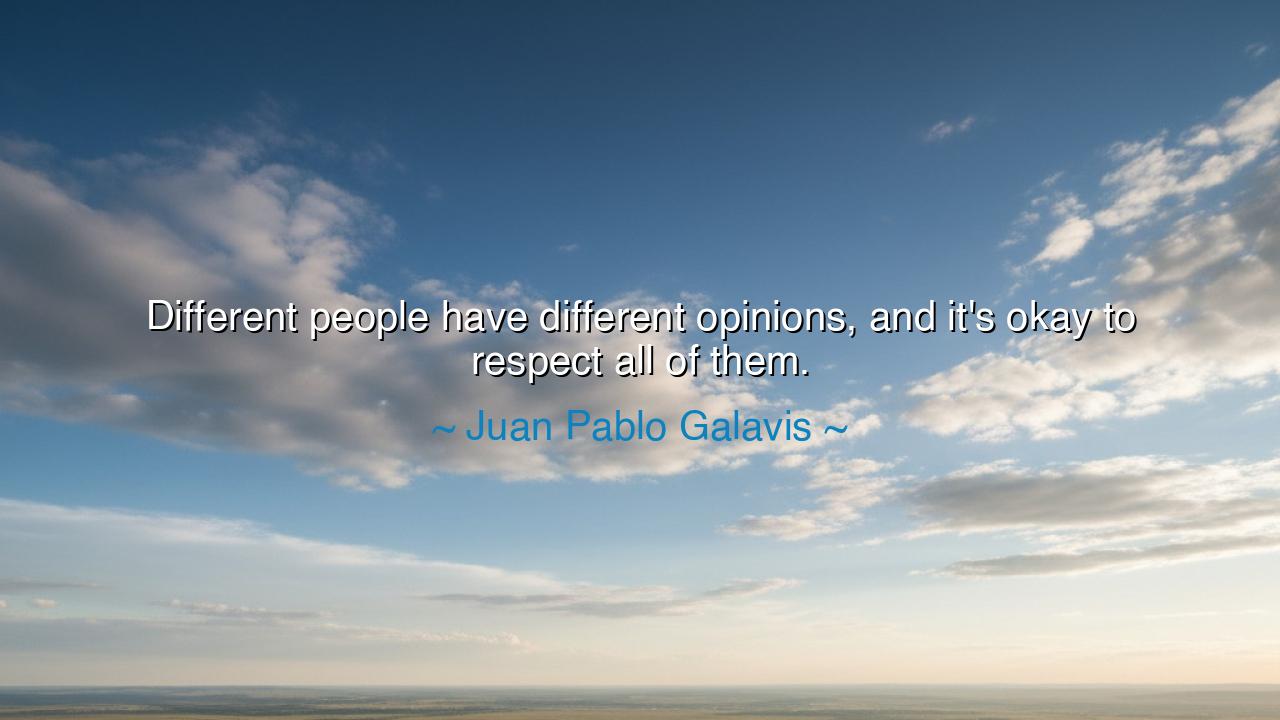
Different people have different opinions, and it's okay to






Juan Pablo Galavis, with words of simplicity that hide profound depth, declared: “Different people have different opinions, and it’s okay to respect all of them.” At first, his saying seems almost obvious, like the clear light of morning. Yet within it lies a treasure of ancient wisdom, for the history of humanity has been scarred by the inability to honor differing voices. What he names is not only a gentle suggestion, but a timeless principle: that respect for differences is the root of peace and the foundation of wisdom.
The first truth in his words is this: diversity of thought is natural. Just as no two leaves on the tree are the same, no two minds will ever see the world alike. To expect one opinion, one truth, one path for all is to wage war against nature itself. The ancients understood this; even in Athens, where philosophers argued fiercely in the marketplace, it was known that debate sharpened truth and that difference was the forge of wisdom. To deny differing opinions is to deny life’s variety, but to respect them is to honor creation itself.
The second truth is that respect is the key. To respect an opinion does not mean to accept it blindly or abandon one’s own beliefs. It means to listen, to allow space, to grant dignity to the voice of another. Respect is not surrender—it is strength, the strength to say, “Though I disagree, I see your humanity, and I will not silence you.” Without respect, opinions become weapons, and discourse becomes war. With respect, opinions become bridges, and dialogue becomes the path to peace.
History provides us with a shining example in the story of Abraham Lincoln. During his presidency, he surrounded himself not with flatterers, but with rivals—men who often disagreed with him fiercely. Yet he respected their voices, and by listening, he built decisions stronger than his own vision alone. In respecting differing opinions, he was able to guide a nation through the storm of civil war. His example proves Galavis’s words true: respecting different perspectives does not weaken a leader—it strengthens him.
The absence of such respect, on the other hand, has led to destruction. The wars of religion that ravaged Europe were not fought over land or treasure, but over opinions of the divine. Each side, unable to respect the other’s voice, shed rivers of blood. Here lies the warning: when respect is absent, opinions become daggers, and the diversity meant to enrich humanity becomes its ruin. Galavis’s wisdom is not new—it is the antidote to the tragedies of ages.
O children of tomorrow, hear this teaching: it is not enough to tolerate; one must practice true respect. This means listening without contempt, speaking without hatred, and remembering that every opinion springs from a life shaped by unique joys, struggles, and wounds. You may not agree, and indeed you should not agree with all things, but you must respect the person behind the thought. For in this way, you protect the dignity of humanity itself.
The lesson is clear: if you wish for peace in your home, your community, or your nation, begin with respect for differing voices. Practice listening before judging. When you encounter opinions that challenge you, respond not with anger, but with curiosity. Ask, “What shaped this view? What truth might lie within it?” By doing so, you grow in wisdom, and you offer others the greatest treasure—dignity.
Thus let the words of Juan Pablo Galavis be carried as a lantern for our time: “Different people have different opinions, and it’s okay to respect all of them.” Live this truth, and you will sow harmony where there is division, compassion where there is strife, and strength where there is weakness. For respect is not the enemy of conviction—it is the crown of wisdom, and the path to peace that endures.






AAdministratorAdministrator
Welcome, honored guests. Please leave a comment, we will respond soon